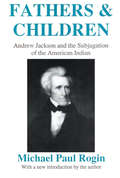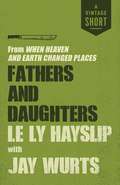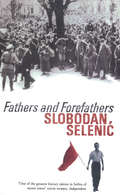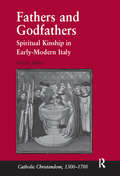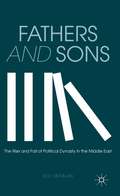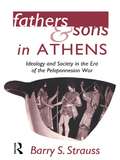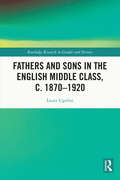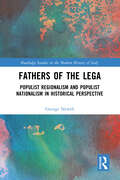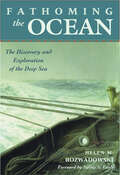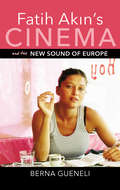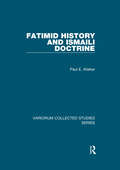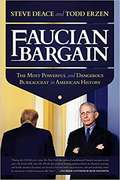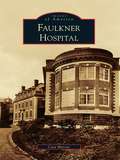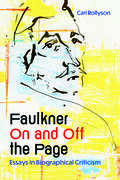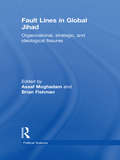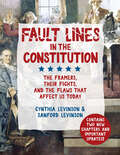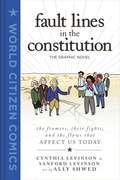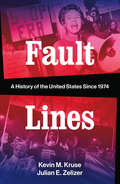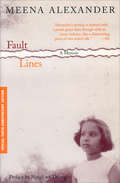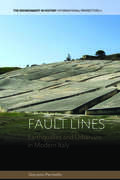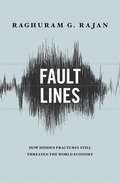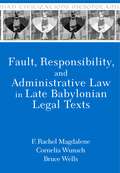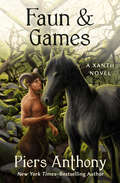- Table View
- List View
Fathers and Anglicans: The Limits of Orthodoxy
by Arthur MiddletonWith a need to proclaim Christian truth afresh in each generation this book examines Anglican roots, and studies the controversies, and the struggle for identity, that Anglicanism has had to face in the aftermath of the Reformation. Includes vignettes of the lives of notable Anglicans, such as Thomas Cranmer, Thomas, Fuller, Lancelot Andrewes, and others.
Fathers and Children: Andrew Jackson and the Subjugation of the American Indian
by Michael Paul RoginRogin shows us a Jackson who saw the Indians as a menace to the new nation and its citizens. This volatile synthesis of liberal egalitarianism and an assault on the American Indians is the source of continuing interest in the sobering and important book.
Fathers and Daughters: from When Heaven and Earth Changed Places
by Le Ly Hayslip Jay WurtsThe youngest of six children in a close-knit Buddhist family, Le Ly Hayslip was twelve years old when U.S. helicopters landed in Ky La, her tiny village in central Vietnam. As the government and Viet Cong troops fought in and around Ky La, both sides recruited children as spies and saboteurs. Le Ly was one of those children. In this harrowing selection from the memoir of a girl on the verge of womanhood in a world turned upside down is a poignant picture of Vietnam, then and now, and of a courageous woman who experienced the true horror of the Vietnam War—and survived to tell her unforgettable story.A Vintage Shorts Vietnam Selection. An ebook short.
Fathers and Forefathers
by Slobodan SelenicA touching story of cultural difference and tested loyalties. Set in Belgrade before WWII, Fathers and Forefathers tells the story of the marriage between a Steven, a Serb, and Elizabeth, an Englishwoman. After meeting at an English university they marry and leave England to build their life together. Steven's narrative and Elizabeth's letters home reveal two very different personal accounts of the difficulties this involves. Raised in Serbia their son, Mihajlo, is ashamed of his mixed parentage and rebels against his non-Serbian ancestry. On the eve of the war, Steven's loyalties are challenged when his counsel is sought by both the Serbian king and the opposition. He resolves to keep his distance from the conflict, but Mihajlo's more radical response forces him to become involved, and tragedy engulfs the family.
Fathers and Godfathers: Spiritual Kinship in Early-Modern Italy (Catholic Christendom, 1300-1700)
by Guido AlfaniIn medieval Europe baptism did not merely represent a solemn and public recognition of the 'natural' birth of a child, but was regarded as a second, 'spiritual birth', within a social group often different from the child's blood relations: a spiritual family, composed of godfathers and godmothers. By analyzing the changing theological and social nature of spiritual kinship and godparenthood between 1450 and 1650, this book explores how these medieval concepts were developed and utilised by the Catholic Church in an era of reform and challenge. It demonstrates how such ties continued to be of major social importance throughout the sixteenth and seventeenth centuries, but were often used in ways not always coherent with their original religious meaning, and which could have unexpected social consequences. In particular, the book analyzes in detail the phase of transition from the traditional model of godparenthood which allowed for multiple godparents, to the new couple model (one godfather and one godmother) imposed by Tridentine law. Drawing upon a large database of archival data taken from parish books of baptisms and marriages, pastoral visitations, diocesan statutes, synods and provincial councils, it is shown how attempts were made to resist or to compromise with the Church, thus providing a better understanding of the often contested meaning given to godparenthood by early modern society. Whilst the Church was ultimately successful in imposing its will, the book concludes that this was to have unexpected results that were to eventually weaken the role of godparents. Rather than persuading parents to choose real 'spiritual tutors' to act as godparents, the choice of godparents became increasingly influenced with social status, so that godparenthood began to resemble a pure clientele system, something it had never been before. Through this long-term exploration of Catholic spiritual kinship, much is revealed, not only about godparenthood, but about the wider social and religious networks. Comparison with Protestant reactions to the same issues provides further insight into the importance of this subject to early modern European society.
Fathers and Sons
by M. E. McmillanThis book traces the rise of the political dynasty in the Middle East and, in the process, provides the context for the current Arab uprising. The author shows that a father-to-son transfer of power has no basis in Islam, and yet the idea of dynastic power became entrenched in the Middle East.
Fathers and Sons in Athens: Ideology and Society in the Era of the Peloponnesian War
by Barry StraussAs history's first democracy, classical Athens invited political discourse. The Athenians, however could not completely separate the politicals from the private sphere; indeed father-son conflict, from patricide to murdering one's son, was a major public as well as a private theme. In a fascinating historical reappraisal, the author explores the consequences, for Athens and us, of the powerful influence of familial ideology on politics.
Fathers and Sons in the English Middle Class, c. 1870–1920 (Routledge Research in Gender and History #43)
by Laura UgoliniThis book explores the relationship between middle-class fathers and sons in England between c. 1870 and 1920. We now know that the conventional image of the middle-class paterfamilias of this period as cold and authoritarian is too simplistic, but there is still much to be discovered about relationships in middle-class families. Paying especial attention to gender and masculinities, this book focuses on the interactions between fathers and sons, exploring how relationships developed and masculine identities were negotiated from infancy and childhood to adulthood and old age. Drawing on sources as diverse as autobiographies, oral history interviews, First World War conscription records and press reports of violent incidents, this book questions how fathers and sons negotiated relationships marked by shifting relations of power, as well as by different combinations of emotional entanglements, obligations and ties. It explores changes as fathers and sons grew older and assesses fathers’ role in trying to mould sons’ masculine identities, characters and lives. It reveals negotiation and compromise, as well as rebellion and conflict, underlining that fathers and sons were important to each other, their relationships a significant – if often overlooked – aspect of middle-class men’s lives and identities.
Fathers of the Lega: Populist Regionalism and Populist Nationalism in Historical Perspective (Routledge Studies in the Modern History of Italy)
by George NewthThis book investigates the historical roots of the Italian Republic’s oldest surviving political party, the populist far right Lega (Nord), tracing its origins to post-war Italy. The author examines two main case studies: the Movements for Regional Autonomy (MRAs), the Piedmontese Movement for Regional Autonomy (the MARP) and the Bergamascan Movement for Autonomy (the MAB), both of which formed a first wave of post-war populist regionalism from 1955 until 1960. The regionalist leagues which later emerged in both Piedmont and Lombardy in the 1980s – and which would later form part of the Lega Nord – represented in many ways a revival of the MRAs’ populist regionalist discourse and ideology and, therefore, a second wave of post-war populist regionalism. Despite this, neither the MRAs nor the twenty year gap between these waves of activism have received the attention they deserve. Drawing on a series of archival and secondary sources this book takes an innovative approach which blends concepts and theories from historical sociology and political science. It also provides a nuanced examination of the continuities and discontinuities between the MRAs and the Lega from the 1950s until time of publication. This contributes to debates not only in contemporary Italian history, but also populism and the far right. While rooted in historical approaches, the book’s interdisciplinarity makes it suitable for students and researchers across a variety of subject areas including European history, modern history, and political history.
Fathoming the Ocean: The Discovery and Exploration of the Deep Sea
by Helen M Rozwadowski&“[An] amiable, in-depth examination of the most critical era for the development of modern oceanography&” (Publishers Weekly). In a history at once scientific and cultural, Helen Rozwadowski shows us how the Western imagination awoke to the ocean's possibilities?in maritime novels, in the popular hobby of marine biology, in the youthful sport of yachting, and in the laying of a trans-Atlantic telegraph cable. The ocean emerged as important new territory, and scientific interests intersected with those of merchant-industrialists and politicians. Rozwadowski documents the popular crazes that coincided with these interests?from children's sailor suits to the home aquarium and the surge in ocean travel. She describes how, beginning in the 1860s, oceanography moved from yachts onto the decks of oceangoing vessels, and landlubber naturalists found themselves navigating the routines of a working ship's physical and social structures.Fathoming the Ocean offers a rare and engaging look into our fascination with the deep sea and into the origins of oceanography?origins still visible in a science that focuses the efforts of physicists, chemists, geologists, biologists, and engineers on the common enterprise of understanding a vast, three-dimensional, alien space. &“Rozwadowski greatly expands our own understanding, all while telling a story that is original, wide-ranging, and illuminating.&” —Margaret Deacon, Southampton Oceanography Centre, author of Science and the Sea: The Origins of Oceanography &“Required reading for anyone wanting to understand how the oceans have come to play the role that they do in Western knowledge.&” —Eric L. Mills, Dalhousie University and author of Biological Oceanography: An Early History, 1870-1960 &“Chronicles the birth of deep-sea oceanography, from early observations by Benjamin Franklin to the voyage of HMS Challenger in the 1870s. [Rozwadowski] weaves a rich narrative from the world of renowned as well as lesser-known oceanographers.&” —Nature
Fatih Akin's Cinema and the New Sound of Europe (New Directions in National Cinemas)
by Berna GueneliIn Fatih Akın’s Cinema and the New Sound of Europe, Berna Gueneli explores the transnational works of acclaimed Turkish-German filmmaker and auteur Fatih Akın. The first minority director in Germany to receive numerous national and international awards, Akın makes films that are informed by Europe’s past, provide cinematic imaginations about its present and future, and engage with public discourses on minorities and migration in Europe through his treatment and representation of a diverse, multiethnic, and multilingual European citizenry. Through detailed analyses of some of Akın’s key works—In July, Head-On, and The Edge of Heaven, among others—Gueneli identifies Akın’s unique stylistic use of multivalent sonic and visual components and multinational characters. She argues that the soundscapes of Akın’s films—including music and multiple languages, dialects, and accents—create an “aesthetic of heterogeneity” that envisions an expanded and integrated Europe and highlights the political nature of Akın’s decisions regarding casting, settings, and audio. At a time when belonging and identity in Europe is complicated by questions of race, ethnicity, religion, and citizenship, Gueneli demonstrates how Akın’s aesthetics intersect with politics to reshape notions of Europe, European cinema, and cinematic history.
Fatimid History and Ismaili Doctrine (Variorum Collected Studies #900)
by Paul E. WalkerThe thirteen studies in this volume explore critical problems in Fatimid history and historiography, many specifically focused on the content of doctrinal writings produced by the Ismaili supporters and agents of this caliphate who worked on behalf of the dynasty both within the empire and outside. Several concern issues in disputes that separated the various factions of Medieval Islam and served to distinguish the Ismailis from the rest, often branding the Fatimids with the charge of heterodoxy. Others deal with the consequence of Shiite rule over a largely non-Shiite populace. Yet others involve the relationship between religious ideology and the administration of government. Among the themes featured in this collection there are separate investigations of institutions of learning, of succession to the imamate, the da`wa, the judiciary, relations with the Byzantines and with the Abbasids, and works on heresiography, doctrines of time and the accusation that the Ismailis upheld the metempsychosis of the human soul. The latter topics help to situate the Ismailis, and hence the Fatimids, within the broader context of Islamic thought.
Faucian Bargain: The Most Powerful And Dangerous Bureaucrat In American History
by Steve Deace Todd ErzenAs seen on Tucker Carlson Tonight As heard on Glenn Beck and Mark Levin “In his famous Farewell Address, President Eisenhower warned about allowing public policy to become captive to a scientific elite without regard to the principles of our constitutional system and the goals of a free society. Eisenhower was prescient. During the COVID crisis, states like New York that embraced unadulterated Faucism saw poor results across the board, while states that pursued an Eisenhower-style approach like Florida protected freedom and performed better in education, economy and health outcomes. Executives are elected to lead and make tough decisions, and such leadership cannot be outsourced to health bureaucrats like Fauci.” —Florida Governor Ron DeSantis “In this important book the authors do the job our uninquisitive media has failed to do throughout this ordeal. Confirming with cited and sourced details the enemy of both liberty and logic the lockdowns have proven to be. Which also proves too much power in the hands of an unelected bureaucrat, regardless of his intentions, can no longer be our new normal.” —U.S. Senator Rand Paul (R-KY) Can liberty survive in the hands of one all-powerful, unchallenged, and unelected bureaucrat? It wasn’t too long ago that the average American didn’t know who Anthony Fauci was. Now, after the coronavirus has spread nationwide, he’s arguably the most powerful bureaucrat in American history. But is it dangerous for a free society to concentrate so much power in the hands of an unelected official? Who or what holds Fauci accountable? “Steve Deace is a true patriot whose zeal for liberty is undeniable. Every day, Steve walks the walk when it comes to fighting for Americans' fundamental rights. This book is written with a keen understanding of the pain and devastation we've all seen throughout this pandemic. Throughout, Steve's passion for protecting Americans' freedoms is ever-present.” —U.S. Senator Ted Cruz (TX) “This is an important book, to both get answers to how we got here and to help us never succumb to something like this ever again. Permitting unelected bureaucrats to hold this much power indefinitely doesn't end well.” —Mark Levin, New York Times best-selling author and talk show host “In their typical fashion, Steve Deace and Todd Erzen spare no expense in pursuit of truth. We’ve been told a lot of things during this pandemic, and a lot of them contradict each other. This book uses documented data and sources to cut through the clutter, most of it Fauci’s, and bring us to a place of reason and science.” —Glenn Beck, New York Times bestselling author and Radio Hall of Fame broadcaster
Faulkner Hospital
by Cara MarcusThe story of Faulkner Hospital begins with the Faulkner family. Dr. George Faulkner's ancestry includes one of the first woolens manufacturers, a Revolutionary War colonel, and an accused Salem witch. When Dr. Faulkner's daughter Mary died, the hospital was established in her honor. Paul Revere's great-granddaughter broke ground on the hospital, which sits on land where the Peacock Tavern, owned by Samuel Adams, once stood. The original building contained 26 beds, 6 of which were free. A nursing school opened in 1903, on the day the hospital opened. Using images from the hospital's vast archives, Faulkner Hospital celebrates the hospital's centennial and explores its rich history as a leader in medicine, education, and community enrichment. Faulkner Hospital is a major teaching hospital to Harvard and Tufts Medical Schools, with many clinical firsts, like the discovery of rejuvenated blood. It is also home to world-renowned breast and headache centers and has implemented many unique concepts, including nurservers and monorails. Readers will learn about the hospital's role in the movie Whose Life Is It Anyway? and discover the famous writers, athletes, and royalty who have visited.
Faulkner On and Off the Page: Essays in Biographical Criticism
by Carl RollysonThough numerous biographies have been published on William Faulkner, readers are often presented conflicting interpretations of his life and work. Faulkner’s view of himself and his own family was mercurial, and it is widely acknowledged that Faulkner was an unreliable narrator of his own life. As a result, biographies of Faulkner echo and complicate the multitude of ways he portrayed himself, accepting that truth—if it exists—is subjective. Like his work, Faulkner’s own life, then, is not only open to different readings but welcomes them within the landscape of his oeuvre.Faulkner On and Off the Page acknowledges the challenges of “factifying” a life into a textual narrative, while also emphasizing the potential for biography to establish a throughline that traces how literature emerges from life and, in turn, shapes the life narrative Faulkner constructed for himself. Unburdened by the sanctity of the written word, Faulkner embraced mutability and perpetual evolution. This process of reinvention also manifests within the pages of Faulkner's biographies, as each biographer brings a unique context and perspective shaped by generations of Faulkner scholars.Rather than thinking of Faulkner as exclusively the great high modernist who strayed to Hollywood when he needed the money and stayed home when he didn’t, this book portrays an unsettled writer incessantly on the move incorporating what only looked like alien elements into his work, while maintaining a public persona that disparaged anything that did not fit the narrative of the novelist he created in interviews, essays, and speeches. This book attempts to carry on the work of finding the man on the page even as he is shaping a life off of it.
Fault Lines in Global Jihad: Organizational, Strategic, and Ideological Fissures (Political Violence)
by Assaf Moghadam Brian FishmanThis book deals with the causes, nature, and impact of the divisions within the jihadi movement, and the splits between jihadis and other Islamic groups. Fault Lines in Global Jihad offers a systematic and comprehensive examination of the broad range of divisions that contribute to the weakening of the jihadi movement. It separates these divisions into two broad categories, namely fissures dividing jihadis themselves, and divisions separating jihadis from other Muslim and Islamist groups. The first part of the book covers intra-jihadi divisions, highlighting tensions and divisions over strategic, tactical, and organizational issues. The second part of the book addresses several important case studies of jihadi altercations with other Muslim and Islamist groups of non-jihadi persuasion, such as the Muslim Brotherhood, Hamas, and the Shii community. More than simply an enumeration of problems and cracks within al-Qa’ida and its cohorts, this book addresses critical policy issues of relevance to the broader struggle against the global jihadi movement. The editors conclude that these divisions have and continue to weaken al-Qa’ida, but neither in an automatic nor in an exclusive fashion—for these divisions render the global jihadi movement simultaneously vulnerable and more resilient. This book will be of much interest to students of jihadism, terrorism and political violence, Islamism, security studies and IR in general.
Fault Lines in the Constitution: The Framers, Their Fights, and the Flaws that Affect Us Today
by Sanford Levinson Cynthia LevinsonA noted children's nonfiction author and one of the nation's foremost constitutional scholars team up to create an essential book on the United States Constitution for everyone grappling with today's most urgent political issues.Many of the political issues we struggle with today have their roots in one place—the U.S. Constitution. Fault Lines in the Constitution takes readers back to the creation of this historic document and reveals how many of the problems that trouble us today—such as voting rights, the Electoral College, gerrymandering—were first introduced. Cynthia and Sanford Levinson explain the unexpected ramifications of decisions make in 1787 and explore possible solutions found in the constitutions of states and other countries.Each chapter begins with a story―all but one of them true―that connects directly back to a section of the document that forms the basis of our society and government. Informative sidebars and graphics run throughout along with a timeline and bibliography.
Fault Lines in the Constitution: The Graphic Novel (World Citizen Comics)
by Sanford Levinson Cynthia LevinsonThe latest volume in our World Citizen Comics graphic novel series, Fault Lines in the Constitution teaches readers how this founding document continues to shape modern American society.In 1787, after 116 days of heated debates and bitter arguments, the United States Constitution was created. This imperfect document set forth America’s guiding principles, but it would also introduce some of today's most contentious political issues—from gerrymandering, to the Electoral College, to presidential impeachment.With colorful art, compelling discourse, and true stories from America's past and present, Fault Lines in the Constitution: The Graphic Novel sheds light on how today's political struggles have their origins in the decisions of our Founding Fathers. Children’s book author Cynthia Levinson, constitutional law scholar Sanford Levinson, and artist Ally Shwed deftly illustrate how contemporary problems arose from this founding document—and then they offer possible solutions.
Fault Lines: A History Of The United States Since 1974
by Julian E. Zelizer Kevin M. KruseTwo award-winning historians explore the origins of a divided America. If you were asked when America became polarized, your answer would likely depend on your age: you might say during Barack Obama’s presidency, or with the post-9/11 war on terror, or the culture wars of the 1980s and 1990s, or the “Reagan Revolution” and the the rise of the New Right. For leading historians Kevin M. Kruse and Julian E. Zelizer, it all starts in 1974. In that one year, the nation was rocked by one major event after another: The Watergate crisis and the departure of President Richard Nixon, the first and only U.S. President to resign; the winding down of the Vietnam War and rising doubts about America’s military might; the fallout from the OPEC oil embargo that paralyzed America with the greatest energy crisis in its history; and the desegregation busing riots in South Boston that showed a horrified nation that our efforts to end institutional racism were failing. In the years that followed, the story of our own lifetimes would be written. Longstanding historical fault lines over income inequality, racial division, and a revolution in gender roles and sexual norms would deepen and fuel a polarized political landscape. In Fault Lines, Kruse and Zelizer reveal how the divisions of the present day began almost five decades ago, and how they were widened thanks to profound changes in our political system as well as a fracturing media landscape that was repeatedly transformed with the rise of cable TV, the internet, and social media. How did the United States become so divided? Fault Lines offers a richly told, wide-angle history view toward an answer.
Fault Lines: A Memoir (The\cross-cultural Memoir Ser.)
by Meena AlexanderPassionate, fierce, and lyrical, Meena Alexander's memoir traces her evolution as a postcolonial writer from a privileged childhood in India to a turbulent adolescence in the Sudan and then to England and New York City. In this tenth-anniversary edition of Fault Lines, this Alexander challenges the assumptions of life as a South Asian American woman writer in a post-9-11 world. With poetic insight and an honesty that will galvanize readers--both familiar and new--Alexander reveals her difficult recovery from a long-buried childhood trauma that revolutionizes the entire landscape of her memory: of her family, of her writing process and the meaning of memoir, and of her very self, now and before.Meena Alexander is a poet and professor of English and creative writing at Hunter College and the City University of New York.
Fault Lines: Earthquakes and Urbanism in Modern Italy (Environment in History: International Perspectives #6)
by Giacomo ParrinelloEarth’s fractured geology is visible in its fault lines. It is along these lines that earthquakes occur, sometimes with disastrous effects. These disturbances can significantly influence urban development, as seen in the aftermath of two earthquakes in Messina, Italy, in 1908 and in the Belice Valley, Sicily, in 1968. Following the history of these places before and after their destruction, this book explores plans and developments that preceded the disasters and the urbanism that emerged from the ruins. These stories explore fault lines between “rural” and “urban,” “backwardness” and “development,” and “before” and “after,” shedding light on the role of environmental forces in the history of human habitats.
Fault Lines: How Hidden Fractures Still Threaten the World Economy
by Raghuram G. RajanRaghuram Rajan was one of the few economists who warned of the global financial crisis before it hit. Now, as the world struggles to recover, it's tempting to blame what happened on just a few greedy bankers who took irrational risks and left the rest of us to foot the bill. In Fault Lines, Rajan argues that serious flaws in the economy are also to blame, and warns that a potentially more devastating crisis awaits us if they aren't fixed. Rajan shows how the individual choices that collectively brought about the economic meltdown--made by bankers, government officials, and ordinary homeowners--were rational responses to a flawed global financial order in which the incentives to take on risk are incredibly out of step with the dangers those risks pose. He traces the deepening fault lines in a world overly dependent on the indebted American consumer to power global economic growth and stave off global downturns. He exposes a system where America's growing inequality and thin social safety net create tremendous political pressure to encourage easy credit and keep job creation robust, no matter what the consequences to the economy's long-term health; and where the U. S. financial sector, with its skewed incentives, is the critical but unstable link between an overstimulated America and an underconsuming world. In Fault Lines, Rajan demonstrates how unequal access to education and health care in the United States puts us all in deeper financial peril, even as the economic choices of countries like Germany, Japan, and China place an undue burden on America to get its policies right. He outlines the hard choices we need to make to ensure a more stable world economy and restore lasting prosperity.
Fault, Responsibility, and Administrative Law in Late Babylonian Legal Texts (Mesopotamian Civilizations #23)
by Bruce Wells F. Rachel Magdalene Cornelia WunschThis book presents a reassessment of the governmental systems of the Late Babylonian period—specifically those of the Neo-Babylonian and early Persian empires—and provides evidence demonstrating that these are among the first to have developed an early form of administrative law.The present study revolves around a particular expression that, in its most common form, reads ḫīṭu ša šarri išaddad and can be translated as "he will be guilty (of an offense) against the king." The authors analyze ninety-six documents, thirty-two of which have not been previously published, discussing each text in detail, including the syntax of this clause and its legal consequences, which involve the delegation of responsibility in an administrative context. Placing these documents in their historical and institutional contexts, and drawing from the theories of Max Weber and S. N. Eisenstadt, the authors aim to show that the administrative bureaucracy underlying these documents was a more complex, systematized, and rational system than has previously been recognized.Accompanied by extensive indexes, as well as transcriptions and translations of each text analyzed here, this book breaks new ground in the study of ancient legal systems.
Fault, Responsibility, and Administrative Law in Late Babylonian Legal Texts (Mesopotamian Civilizations #23)
by Bruce Wells F. Rachel Magdalene Cornelia WunschThis book presents a reassessment of the governmental systems of the Late Babylonian period—specifically those of the Neo-Babylonian and early Persian empires—and provides evidence demonstrating that these are among the first to have developed an early form of administrative law.The present study revolves around a particular expression that, in its most common form, reads ḫīṭu ša šarri išaddad and can be translated as “he will be guilty (of an offense) against the king.” The authors analyze ninety-six documents, thirty-two of which have not been previously published, discussing each text in detail, including the syntax of this clause and its legal consequences, which involve the delegation of responsibility in an administrative context. Placing these documents in their historical and institutional contexts, and drawing from the theories of Max Weber and S. N. Eisenstadt, the authors aim to show that the administrative bureaucracy underlying these documents was a more complex, systematized, and rational system than has previously been recognized.Accompanied by extensive indexes, as well as transcriptions and translations of each text analyzed here, this book breaks new ground in the study of ancient legal systems.
Faun & Games (Xanth Ser. #Vol. 21)
by Piers Anthony“The future sure won’t have been what it used to be” when Piers Anthony reveals a world within the world of Xanth—and its infinite possibilities (Kirkus Reviews). The miraculous and mirth-filled land of Xanth holds many marvels. But now an extraordinary new aspect of this remarkable realm unfolds as young Forrest Faun’s quest takes him to a tiny planet hidden in the heart of Xanth. There, with a delightful “day mare” as his constant companion, Forrest will find more marvels then he ever dreamed of. Packed with magic, mystery, and merrymaking, Faun & Games is the freshest and most exciting Xanth adventure in a month of Pundays! “With plenty of the spry characters and cheerful wordplay for which Anthony’s works are known, this new Xanth tale should, like its predecessors, manage to wiggle its way onto the bestseller lists.” —Publishers Weekly

